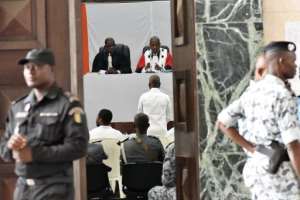
Abidjan (AFP) - The first defendants in the trial of Ivory Coast's former first lady Simone Gbagbo and 82 others accused of fomenting deadly post-electoral violence were on Tuesday called to the stand.
Six of the accused were summoned following a recess in the trial, which began on December 26 in Abidjan. They were presented as "militias" loyal to former president Laurent Gbagbo and his wife.
The once-powerful "Iron Lady" was not in court Tuesday, along with some of the other defendants, but the six accused were brought forward in handcuffs and 14 witnesses were also called to give evidence.
Gbagbo and colleagues from the Ivorian Popular Front (FPI) party are accused of "attempting to undermine the security of state", by launching a bloody struggle to support Laurent Gbagbo in a bid to keep power in the west African country after electoral defeat in November 2010.
Fighting in the commercial capital Abidjan claimed at least 3,000 lives before the Gbagbos was arrested in April 2011 after a French-backed military operation to support the poll winner, President Alassane Ouattara.
Laurent Gbagbo was subsequently transferred to the International Criminal Court in The Hague, where he faces trial for crimes against humanity during the post-electoral conflict.
The ICC has also issued an arrest warrant for Simone Gbagbo. She is accused of running death squads on behalf of her husband's regime from 2000 to 2010, a turbulent decade marked by a rebellion that split the country.
However, Ouattara's government argues that to try Simone Gbagbo at home will be a major step towards national reconciliation, while the proceedings are also widely seen as a test of Ivorian justice.
The first defendant called to the stand was identified as Jean-Marius Keipo, alias "Little Hammer", born in 1976. He took the stand dressed in white from head to toe and sporting a huge beard.
Keipo alone was charged with "damage to national defence, constituting armed groups, participation in an insurrectional movement (and) disturbing the peace," as well a "tribalism" and "xenophobia".
"I don't recognise the statements. I am a victim of this crisis," Keipo told the court once the charges had been read.
The last two charges arise from touchy issues of national identity that have plagued a country with ethnic and religious divisions between the mainly Christian south and the largely Muslim north.
Ivory Coast is also home to scores of thousands of people from other countries in the region who have settled down the decades, drawn by jobs on the plantations of the world's leading cocoa producer.




 Akufo-Addo commissions Phase II of Kaleo solar power plant
Akufo-Addo commissions Phase II of Kaleo solar power plant
 NDC panics over Bawumia’s visit to Pope Francis
NDC panics over Bawumia’s visit to Pope Francis
 EC blasts Mahama over “false” claims on recruitment of Returning Officers
EC blasts Mahama over “false” claims on recruitment of Returning Officers
 Lands Minister gives ultimatum to Future Global Resources to revamp Prestea/Bogo...
Lands Minister gives ultimatum to Future Global Resources to revamp Prestea/Bogo...
 Wa Naa appeals to Akufo-Addo to audit state lands in Wa
Wa Naa appeals to Akufo-Addo to audit state lands in Wa
 Prof Opoku-Agyemang misunderstood Bawumia’s ‘driver mate’ analogy – Miracles Abo...
Prof Opoku-Agyemang misunderstood Bawumia’s ‘driver mate’ analogy – Miracles Abo...
 EU confident Ghana will not sign Anti-LGBTQI Bill
EU confident Ghana will not sign Anti-LGBTQI Bill
 Suspend implementation of Planting for Food and Jobs for 2024 - Stakeholders
Suspend implementation of Planting for Food and Jobs for 2024 - Stakeholders
 Tema West Municipal Assembly gets Ghana's First Female Aircraft Marshaller as ne...
Tema West Municipal Assembly gets Ghana's First Female Aircraft Marshaller as ne...
 Dumsor is affecting us double, release timetable – Disability Federation to ECG
Dumsor is affecting us double, release timetable – Disability Federation to ECG
